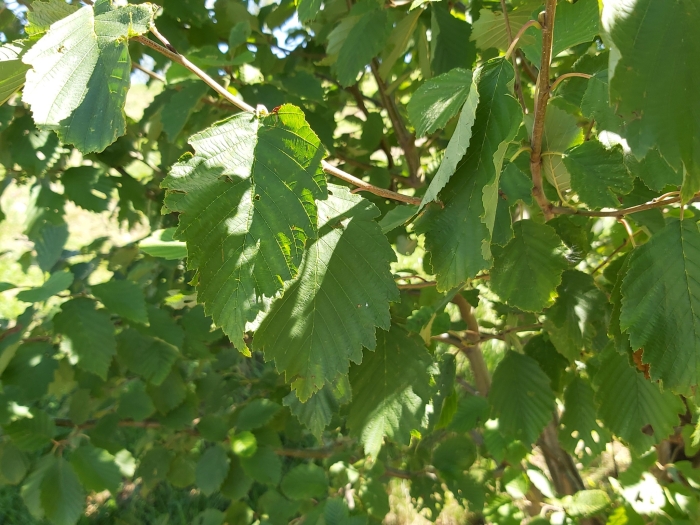Gray Alder
(Alnus incana)
Gray Alder (Alnus incana)
/
/

Tomas Pocius
Public Domain
Image By:
Tomas Pocius
Recorded By:
Copyright:
Public Domain
Copyright Notice:
Photo by: Tomas Pocius | License Type: Public Domain | License URL: http://creativecommons.org/publicdomain/zero/1.0/ | Rights Holder: Tomas Pocius | Publisher: iNaturalist | Date Created: 2020-08-18T13:11:45-07:00 |



















































Estimated Native Range
Summary
Alnus incana, commonly known as Gray Alder, is a deciduous tree or large shrub native to riparian zones, wetlands, and moist forested areas in subarctic, boreal, and temperate regions of North America, Europe, and Western Asia. It typically grows 15–20 meters (49–66 ft) tall and is characterized by its smooth, grey bark that remains unridged even in maturity. The species has a life span of 60 to 100 years. Gray Alder’s leaves are a matte green, and it produces catkins which are not particularly showy. The tree is known for its shallow root system and vigorous production of stump and root suckers, which can lead to dense thickets, especially in the northern parts of its range.
Gray Alder is valued for its ability to grow rapidly and thrive on poor soils, including colonizing screes and shallow stony slopes. It enriches the soil by fixing nitrogen through bacteria in its root nodules, making it useful for reforestation projects on non-fertile lands. In gardens and landscapes, it is often used for its ecological benefits, such as stabilizing stream banks and providing habitat for wildlife. The tree prefers full sun to part shade and requires high amounts of water, growing best in soils with medium to fast drainage. Despite its adaptability, Gray Alder is not commonly used for timber due to the pale color and low economic value of its wood compared to Black Alder (Alnus glutinosa).CC BY-SA 4.0
Gray Alder is valued for its ability to grow rapidly and thrive on poor soils, including colonizing screes and shallow stony slopes. It enriches the soil by fixing nitrogen through bacteria in its root nodules, making it useful for reforestation projects on non-fertile lands. In gardens and landscapes, it is often used for its ecological benefits, such as stabilizing stream banks and providing habitat for wildlife. The tree prefers full sun to part shade and requires high amounts of water, growing best in soils with medium to fast drainage. Despite its adaptability, Gray Alder is not commonly used for timber due to the pale color and low economic value of its wood compared to Black Alder (Alnus glutinosa).CC BY-SA 4.0
Plant Description
- Plant Type: Tree
- Height: 15-25 feet
- Width: 15-25 feet
- Growth Rate: Rapid
- Flower Color: N/A
- Flowering Season: Spring
- Leaf Retention: Deciduous
Growth Requirements
- Sun: Full Sun, Part Shade
- Water: High
- Drainage: Fast, Medium
Common Uses
Bee Garden, Bird Garden, Butterfly Garden, Erosion Control, Low Maintenance, Rabbit Resistant, Salt Tolerant, Water Garden
Natural Habitat
Native to riparian zones, wetlands, and moist forested areas
Other Names
Common Names: Grey Alder , Speckled Alder , Hoary Alder , Grauerle , Grau-Erle , Aulne Blanc , Aulne Gris , Witte Els , Alder , Gråal
Scientific Names: Alnus incana , Alnus incana f. acutiloba , Betula incana , Alnus canadensis , Alnus glutinosa var. incana , Betula alnus var. incana , Alnus februaria var. incana , Alnus incana var. argentea , Alnus incana var. bipinnatifida , Alnus languinosa
GBIF Accepted Name: Alnus incana (L.) Moench